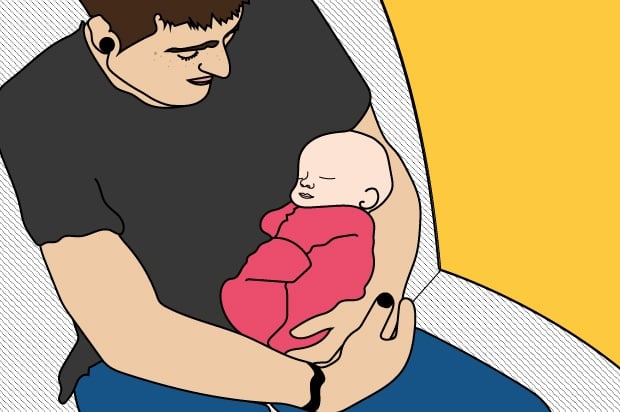Young Dads: Caring for Your Mental Health
Becoming a dad is a huge adjustment no matter your age. We explore how to look after your mental health if you're about to embark on fatherhood.

Fatherhood can be challenging and amazing all at the same time.
Becoming a parent is a huge adjustment, no matter your age and no matter your situation. But research shows young dads are significantly more likely to experience mental health issues than older dads. Why is that? We spoke to Owen Thomas from Working with Men about the challenges faced by young dads and how to get the support you deserve if you’re a young dad.
What are the main challenges faced by young dads?
Owen: Becoming a parent is the single biggest event in anyone’s life, with many seriously challenging transitions involved, from changing social routines and circles to financial obligations and relationship management (both with the mother of your child and with your wider families). Add on to this societal prejudices and the current lack of obvious support for young dads and it’s no wonder becoming a dad is a confusing time which in turn can lead to poor mental health. Some other issues faced by young dads:
- Judgemental attitudes: lots of young dads say they feel ignored, dismissed or thought of as too young or not responsible enough to look after their child.
- Parenting education is often aimed at mothers which means a lack of education for men and boys – both emotional preparation and practical (eg. nappy changing, bathing, feeding etc).
- Some young dads lack a supportive network, whether that’s family, friends or access to services.
- Unstable housing and homelessness
- Some young fathers have difficulty gaining access to their children due to conflict with ex-partners and the current family law system’s take on father’s rights.
How can young dads support their mental health?
Owen: First and foremost try to be open. Share how you feel with people you trust. Old fashioned gender expectations have led to some men being closed off about how they feel. But we now know it’s far healthier to discuss feelings and how you’re dealing with a stressful situation. Other recommendations include:
- Stay connected with your GP (or get registered!). Most are really understanding and will be able to refer you to local mental health services if needed.
- Seek out other young dads to share your experience with. If there aren’t obvious ways to meet people, try connecting online.
- Look for services in your area aimed at supporting young dads. Nationwide organisations such as NCT offer support groups and classes but it’s worth looking for area-specific support too.
- Remember to do the stuff you enjoy. See your mates, play sport, go out. Provided you’re there for your child when they need you, you shouldn’t feel guilty for having fun outside of parenthood.
What other general advice do you have for young dads?
Owen:
- Go along (where possible and appropriate) with your partner to all hospital appointments and scans and make friends with the midwife as she’ll be important before, during and after the birth. This should help dads feel connected to their baby and may offer signposting to relevant local services
- Support your partner as much as you can (before, during and after the birth)
- Prepare yourself as much as you can in terms of practical skills (such as feeding, bathing and changing nappies)
- Spend as much time as you can with your baby so that you can bond with them as early as possible
- Make sure your name is on the birth certificate and that you automatically get parental rights (so you can make important decisions about your baby)
- Remember how important you are to your child’s growth and development
- Decide what kind of father you want to be, and be involved as much as you can be
- Talk with your partner/baby’s mother before the baby arrives about both your hopes for parenthood. Be prepared to compromise
- Enjoy being a father!
Next Steps
- Being Mankind is a project creating conversations about the unique issues that men and boys face in the 21st Century.
- CALM is dedicated to preventing male suicide. Call their national helpline for free on 0800 58 58 58, 5pm-midnight, or visit their webchat service .
- Chat about this subject on our Discussion Boards.
By Olivia Capadose
Updated on 26-Feb-2019
No featured article










